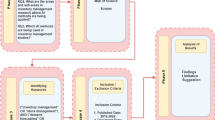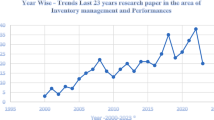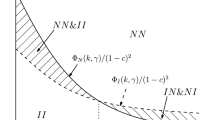Abstract
A stock control bottleneck in a pharmaceutical organization in Lagos State, Nigeria, is presented in the study. The organizational inventory chain in the pharmaceutical store network is examined. To conceptualize the situation within the model, the study proposed a two-situation deterministic stock model that is based on pragmatic presumptions and imperatives within the inventory network. The formulation considers a single drug item, construct lead time, and deterministic request. The deterministic request is addressed as a sales projection for the item. Two mathematical functions are characterized as the optimization of the distinction between arranged mean stock level, acknowledged stock, and the minimization of stock-out circumstances. This was based on a fostered methodology for deciding reorder echelon to accomplish the proposed mathematical formulation that is dependent on request ≤ inventory and request > inventory for 1 year. It is on this premise that the mathematical model of request and inventory is utilized as a mechanism of control to achieve optimality.
Similar content being viewed by others
Data Availability
The data are available on request.
References
Adedugba A, Ogunnaike OO, Adeyemo KA, Kehinde B, Oke G (2022a) Inventory management sustainability: a case of carbon emanation reduction in selected ceramics manufacturing firms in Lagos State, Nigeria. IJSDA 11(1):1–14
Priyana S, Malab P (2020) Optimal inventory system for pharmaceutical products incorporating quality degradation with expiration date: a game theory approach. ORHC 24(100245):1–11
Nimishraj P, Gerk PM (2022) The caco-2 model: modifications and enhancements to improve efficiency and predictive performance. Int J Pharm 624(1220040):1–15
Noucaiba SA, Loubna BB, Abdelaziz B (2022) Multi-echelon inventory system selection: case of distribution systems. IJSOM 9(1):108–125
Saha E, Pradeep R, Ratri P, Nripendra R (2022) The interplay of emerging technologies in pharmaceutical supply chain performance: an empirical investigation for the rise of Pharma 4.0. Technological Forecasting and Social Change 181(121768):1–12
Adedugba A, Ogunnaike OO, Adeyemo KA, Kehinde B, Inegbedion DO (2022b) The degree of material distribution on environmental outcomes in selected large-scale fabrics manufacturing firms in Lagos State, Nigeria: a control approach. J Technol Advance 2(1):1–11
Usman RD, Karaye YI, Abubakar A (2020) Impact of inventory management on profitability of listed pharmaceutical firms in Nigeria. IJRP 44(1):1–16
Wren B (2022) Sustainable supply chain management in the fast fashion industry: a comparative study of current efforts and best practices to address the climate crisis. CLSCN 4(100032):1–12
Svoboda J, Minner S, Yao M (2021) Typology and literature review on multiple supplier inventory control models. Eur J Oper Res 293(1):1–23
Tetteh A, Xu Q, Liu Z (2014) Inventory control by using speculative strategies in dual channel supply chain. J App Res Technol 12(20):296–314
Adedugba TA, Ogunniake OO, Adeyemo KA, Kehinde BE (2021) Extent of material handling and environmental performance of selected textile manufacturing firms in Lagos State. AEJ 27(4):1–10
Majiwala H, Kant R (2022) A state-of-art review of circular economy in the supply chain management: scientometric mapping. Manag Environ Qual 33(5):1226–1248
Zhang Y, Chai Y, Ma L (2021) Research on multi-echelon inventory optimization for fresh products in supply chains. MDPI Journal on Sustainability 13(6309):1–15
Harifi S, Khalilian M, Mohammadzadeh J, Ebrahimnejad S (2021) Optimization in solving inventory control problem using nature-inspired Emperor Penguins colony algorithm. J Intell Manuf 32(6):1–11
Basha MM, Navya W, Wani S, Gogi V (2020) Study of inventory management in pharmaceuticals: a review of Covid-19 situation. IJISRT 5(8):366–371
Kafle P, Bhandari M, Rana LB (2022) Reliability analysis techniques in distribution system: a comprehensive review. IJEM 12(2):11–24
Neill BO, Sanni S (2018) Profit optimisation for deterministic inventory systems with linear cost. Comput Ind Eng 122:303–317
Rahman MA, Uddin MF (2021) Analysis of inventory model with time-dependent quadratic demand function including time variable deterioration rate without shortage. Asian Res J Math 16(12):97–109
Kusum VK (2021) A model for deterministic inventory with deteriorating items with demand dependent on time fractionally and constant holding and cost deterioration rate. IJERT 10(9):1–6
Monique V, Jed F, Mirja S, Thomas B, Prashant Y (2019) Improving supply chain for essential drugs in low-income countries: results from a large scale randomized experiment in Zambia. HS&R 5(2):158–177
Zwaida TA, Pham C, Beauregard Y (2021) Optimization of inventory management to prevent drug shortages in the hospital supply chain. Appl Sci 11(6):1–20
Efrilianda DA, Umam K, Aulia AF (2021) Inventory control and distribution of medicine stocks by using a just in time method based on interactive web applications. JPCS 1918(4):1–6
Stopková M, Stopka O, L’upták V (2019) Inventory model design by implementing new parameters into the deterministic model objective function to streamline effectiveness indicators of the inventory management. Sustainability 11(4175):1–15
Zuo J, Xu J, Qian C (2023) A hybrid mathematical model for estimation of runoff uncertainty influenced by climate drivers. Stoch Env Res Risk Assess 37(2):595–610
Moradi S, Gholamian MR, Sepehri A (2023) An inventory model for imperfect quality items considering learning effects and partial trade credit policy. Opsearch 60(1):276–325
Jauhari WA, Pujawan IN, Suef M (2023) Sustainable inventory management with hybrid production system and investment to reduce defects. Ann Oper Res 324(1):543–572
Becerra P, Mula J, Sanchis R (2023) Mathematical programming models for sustainable inventory management in a supply chain. In: IoT and Data Science in Engineering Management: Proceedings of the 16th International Conference on Industrial Engineering and Industrial Management and XXVI Congreso de Ingeniería de Organización. Springer International Publishing, Cham, pp 152–157
Rashid R, Hoseini SF, Gholamian MR, Feizabadi M (2015) Application of queuing theory in production-inventory optimization. J Ind Eng Int 11:485–494
Sandhya E, Sreenivasan C, Skaria S, Nair SS (2023) An explicit solution for an inventory model with server interruption and retrials. In Information technologies and mathematical modelling. Queueing theory and applications: 21st International Conference, ITMM (2022) Karshi, Uzbekistan, October 25–29, 2022, Revised Selected Papers. Springer Nature Switzerland, Cham, pp 149–161
Antic S, Djordjevic ML, Lisec A (2022) Dynamic discrete inventory control model with deterministic and stochastic demand in pharmaceutical distribution. J Appl Sci 12(1536):1–27
Pınarbaşı A, Vizvári B (2022) A deterministic model for the inventory policy of countries for procurement of vaccines. Cent Eur J Oper Res 1–13
Abidemi A (2023) Optimal cost-effective control of drug abuse by students: insight from mathematical modeling. MESE 9(1):811–829
Wu Q, Zhang G, Wang B, Zhong L, Xiao F (2023) Performance comparison of deterministic and stochastic modifications in stokes’s and hotine’s formulas: the case of Jilin Province China. Remote Sens 15(376):1–19
Tako AA, Robinson S (2012) The application of discrete event simulation and system dynamics in the logistics and supply chain context. Decision Support System 52:802–815
Adedugba A, Asikhia O, Inegbedion D, Ogunnaike O (2023) Transportation management and economic performance of selected textile firms in Lagos State. WSEAS Trans Bus Econ 20:1–8
Algendi A, Urrutia S, Hvattum LM (2023) Optimizing production levels in maritime inventory routing with load-dependent speed optimization. Flex Serv Manuf J 35(1):111–141
Funding
None.
Author information
Authors and Affiliations
Contributions
Adedugba Adebayo: conceptualization, methodology, software, and writing—original draft preparation. Inegbedion Daniel and Oreagba Oluwakemi: review and editing.
Corresponding author
Ethics declarations
Competing interests
The authors declare no competing interests.
Ethics Approval
Not applicable.
Consent to Participate
Not applicable.
Consent for Publication
Not applicable.
Conflict of Interest
The authors declare no competing interest.
Supplementary Information
Below is the link to the electronic supplementary material.
Rights and permissions
Springer Nature or its licensor (e.g. a society or other partner) holds exclusive rights to this article under a publishing agreement with the author(s) or other rightsholder(s); author self-archiving of the accepted manuscript version of this article is solely governed by the terms of such publishing agreement and applicable law.
About this article
Cite this article
Adebayo, A., Daniel, I. & Oluwakemi, O. Dynamics of Finished Goods Inventory Control Framework: A Deterministic Request in Product Appropriation. Oper. Res. Forum 5, 31 (2024). https://doi.org/10.1007/s43069-024-00311-1
Received:
Accepted:
Published:
DOI: https://doi.org/10.1007/s43069-024-00311-1






